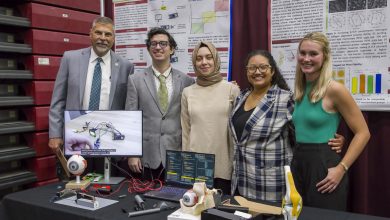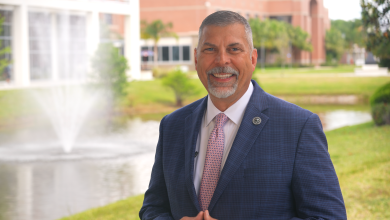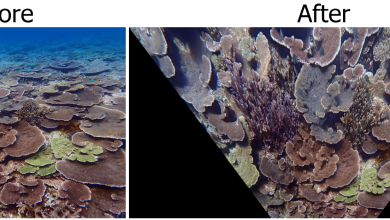FAA-Funded Florida Tech Researchers Explore Commercial Space Vehicles Sharing Airspace
MELBOURNE, FLA.—Just as the advent of the aerial age more than 100 years ago led to new safety regulations, the 21st Century introduction of commercial space vehicles (CSVs) leads to unanswered and even unasked questions. How are CSVs to be part of the national airspace system? To begin asking this and related questions, a Florida Institute of Technology research team has received almost $90,000 in FAA funding, with a match from Space Florida, for work that is well underway.
Florida Tech Professor Emeritus Nat Villaire has assembled a team to research the methodology to begin this integration.
“We are identifying top-level, pertinent questions which must be answered if commercial space vehicle operations are to integrate into the national airspace system using the existing air traffic control system,” said Villaire. “Our objectives are to examine the airspace-related Federal Air Regulations and FAA air traffic control orders for compatibility with commercial space vehicle operations.”
The team’s plan is to identify related FAA orders and regulations; assist the FAA and CSV operators by identifying specific questions affecting integration; develop the important questions to resolve; and increase the depth of information necessary for routine commercial space vehicle operations.
The research will explore procedures pertaining to pre-flight, takeoff, departure, exiting and entering the airspace; arrival and landing. For example, “What kind of weather, runway and atmospheric restrictions will be required for CSVs in takeoff?” And, when a CSV transits from national air space to space: “Should high-speed, high-altitude climb corridors dedicated to CSV operations be developed?”
The team will build a guide for the FAA to help the organization address and analyze the issues presented by integrating CSVs into the national air space.
Florida Tech team members include Nicole Maillet and Nicholas Kasdaglis, research assistants; John Deaton, professor of aeronautics; Samuel Durrance, professor of physics and space sciences; Daniel Kirk, associate professor of mechanical and aerospace engineering; and Tristan Fiedler, associate vice president for research.
Also, Embry Riddle Aeronautical University (ERAU) supports Florida Tech’s lead role with simulations in ERAU’s FAA-funded research laboratory.
For more information, contact Villaire at natvillaire@cfl.rr.com.




